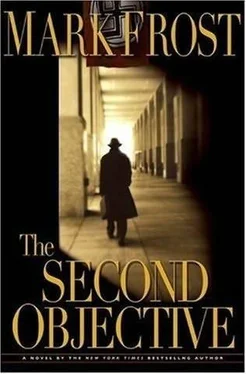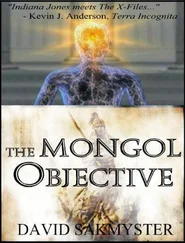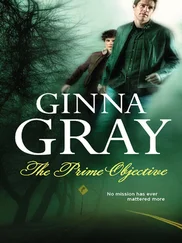Bernie thought about it for a moment. “You said first objective.”
“Did I?”
“Does that mean there’s a second one?”
Von Leinsdorf didn’t look at him. Bernie felt him hiding something, and tried again.
“All those crazy stories flying around camp. We went through all that training just to take a few bridges and sit on our hands?”
“What are you asking?”
“You know what I’m asking,” said Bernie. “Are we supposed to do something else?”
Again Von Leinsdorf kept quiet.
“Doesn’t take a genius to figure it out,” said Bernie, trying to keep the alarm from his voice. “Skorzeny gave you another assignment. You picked the other squads.”
“What if he did?” said Von Leinsdorf.
“Then come on, at least tell me what it is.”
Von Leinsdorf bent over the radio to transmit a coded report of their progress.
“When our tanks cross this bridge,” said Von Leinsdorf, “all that stands between them and the coast at Antwerp is seventy miles of open highway. Once they’re past here, we move on to something else. And that’s all I can say.”
He stared at Bernie, hard, then turned back to the radio.
Okay, asshole, thought Bernie. Keep your secret. But I’m going to find out what it is .
East of Elsenborn
DECEMBER 16, 1:00 A.M.
“Their relief detail showed up as scheduled at fourteen hundred hours yesterday afternoon,” said the MP, “but the squad’s position couldn’t be immediately ascertained.”
“You mean they weren’t here,” said Grannit.
“That’s correct, sir.”
The MP walked Grannit from the jeep toward the cinder-block guard house. The young soldier-too eager to please-had been first on the scene with jurisdiction ever since he’d arrived a few hours ago. Once the bodies were discovered, a crowd had descended. Grannit could already see they’d made a hash of it, two dozen soldiers trampling the crime scene. What was left of the snow had melted into thick slurry and frozen again during the night. Grannit picked up a stick and ran it along the ground.
“What’s your name, son?”
“Chester Brosh, sir.”
“Chester, take a deep breath, blow your whistle, and get that giant cluster fuck over here behind this line I’m drawing,” said Grannit.
“Right now, sir?”
“Yes, right now.”
Chester blew his whistle. It took five minutes to clear traffic in front of the block house. Grannit had the drivers line up all the vehicles in a semicircle and turn on their headlights. Once the block house was lit up and secure, he walked around and studied the scene from different angles, knelt down to look at some tire tracks, pointed out areas he wanted Ole and the other MPs to comb over, then told Chester to lead him to the bodies.
Grannit used a flashlight to follow the ground toward the woods as they walked. Under a dense copse of fir trees, many of the branches still laden with snow, three bodies lay next to one another. They were stiff with cold and rigor mortis. Each had been stripped of his jacket and dog tags. One was missing his boots.
“Anybody ID these men?” asked Grannit.
“Guys from their squad say this is Private Anderson and that’s Private Ellis,” said Brosh, pointing to the man without boots. “They had a third man out here with them, Sergeant Mallory, but we can’t find him.”
“So who the hell is this guy?”
“They didn’t know him, sir.”
Grannit looked at the third man. Near forty. Weathered, windburned face and a working man’s hands. He studied the man’s right hand, then examined his wounds. A single shot, left torso, with a large exit wound through the back, probably a rifle round. Double-tap gunshot wound to the head, small-caliber, close-range, the same as Ellis. He had a small tattoo on his right shoulder, a nautical anchor and rope. Grannit looked into the man’s mouth, then took out a plastic bag and secured it around the man’s right hand.
Grannit lit a cigarette and settled back on his haunches. All three men had been killed out by the road; then, judging by the boot prints, they were dragged back here by three fellow GIs. As he examined the ground, he noticed another faint drag line in the dirt moving away from this spot deeper into the woods. He followed it with his flashlight. About fifty yards into the trees the beam flashed on another pair of combat boots. Grannit pulled his pistol and hurried toward them.
A fourth man had dragged himself away from the others. He had scooped out a shallow depression to keep himself warm, and covered himself with downed branches, which Grannit hurriedly tossed aside. The soldier still wore his field jacket and lay on his side, curled up, unconscious. Grannit felt for a pulse.
“This man’s still alive,” said Grannit.
A medic summoned to the scene covered him in blankets and pumped four units of blood into Sergeant Mallory as they drove him to a field hospital ten miles away in Malmédy.
At five in the morning Grannit completed his sweep of the checkpoint. The other soldiers hadn’t been any help, but Ole Carlson collected eight shell casings from around the guard gate, six small-caliber and two copper-jacketed M1 rounds. Ten yards short of the gate, where Grannit found tire tracks in the mud, he turned up three more pistol rounds. Grannit also bagged a broken cigarette, a Lucky Strike, unsmoked. He pinpointed a number of bloodstains-one on the base of the road gate itself-and a few more footprints, all of them regulation GI combat boots.
Before they took the bodies away, Grannit asked the medic to have the hospital remove any bullets before they were turned over to a graves detail. He needed them for forensics, and if it wasn’t too much to ask, he also wanted autopsies. The medic said he’d try, and told him to come by the field hospital later that morning when they’d have a clearer picture of Sergeant Mallory’s condition. Grannit agreed. If Mallory made it, Grannit wanted to be there when he came around.
Ole Carlson brought him a cup of coffee from a supply wagon and they stood near the block house, stamping their feet to stay warm.
“What do you think happened, Earl?” asked Carlson.
“They drive up in a Willys out of the north, down the logging road. Pull up short of the gate. The detail’s playing cards inside; they step out to question them. Whatever the beef was, it starts here, next to the jeep. Mallory, Ellis, and the third man are tapped by the same shooter. Somebody else kills Anderson over by that gate. The third man’s hit first by a second shooter, in the chest, with an M1. Then he was shot in the head afterward like the others. The third man’s the only one of them who discharged his pistol.”
Carlson stared at him with his mouth open. “Geez, you think he killed the other two?”
“No, Ole,” said Grannit patiently. “He got shot the same as Ellis, right? In the head.”
“Right.”
“I think the third guy ran toward the gate and shot Anderson-he’s got six small-caliber rounds in him-and Anderson shot him back with the M1. Won’t know for sure till I see the bullets, if they don’t fuck that up at the hospital, which is a big if.”
“Okay,” said Carlson. “So we got GIs shooting GIs. Maybe it’s a robbery. Maybe the parties knew each other. Maybe the killers drove out here to settle some score, or a gambling debt-”
“Facts first, theories later.” Grannit stepped forward, setting the scene. “Our third man came in on the jeep with three others. One of those men is the main shooter.”
“They shoot ’em, drag the bodies, dump ’em in the woods, and just drive off?”
“That’s right. With one of ’em wearing a new pair of boots,” said Grannit. “Ask the MPs in Elsenborn if any jeeps came through there last night that fit the profile. See if any infantry dug in around here heard anything. The trail’s already cold.”
Читать дальше












